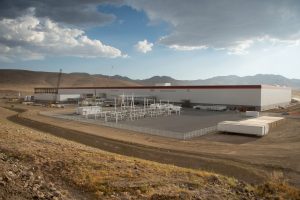Tesla has launched the third iteration of its solar roof tile for residential home use, which it officially detailed in a blog post on Friday and in a call with media. Tesla CEO Elon Musk kicked off the call with some explanatory remarks on the V3 Solar Roof, and then took a number of questions. The company says it’ll begin installations in the coming weeks (Musk says some installations have already begun) and that it hopes to ramp production to as many as 1,000 new roofs per week.
Tesla’s solar roof tiles — which are designed to look just like normal roof tiles when installed on a house, while doubling as solar panels to generate power — are something of a work-in-progress. The company is still tinkering with the product three years after announcing the concept, having done trial installations with two different iterations so far. “Versions one and two we were still figuring things out,” said Elon Musk on an earnings call earlier this week, adding that he thinks “version three is finally ready for the big time.”
Tesla’s Solar Roof website now includes a pricing estimator, which lists $42,500 as the total price for the average 2,000 square-foot home, with 10kW solar panels. It also lists $33,950 as the price after an $8,550 federal tax incentive. You can also enter your address and get an updated estimate that takes into account local costs and incentives, and add on any Powerwalls (with three as the default for a 2,000 square-foot roof).
“The solarglass roof is not going to make financial sense for somebody who has a relatively new roof, because this is itself a roof, that has integrated solar power generation,” Musk explained. He went on to note that Tesla has managed with this version three product to achieve a price point that is “less than what the average roof costs, plus the solar panels” that you would add on top of said roof.
“Figuring out how to install it effectively is very non-trivial. And we’re actually going to have […] ‘installathons,’ ” Musk said, which will pit two teams against each other to see who can roof one of two similar-sized/designed roofs faster. Musk reiterated later that there’s “quite a bit of R&D just in the installation process itself.”
Musk also said that while it’s hiring and training specialized installers at first, the plan is to ultimately expand installations to any third-party contractors as well. On the call, he and the Tesla team discussed how they focused on getting the installation time down to where it’s faster than installing traditional shingles, plus solar panels on top of that. Musk added that his ultimate goal is to install the solar glass tiles even faster than comparative shingles. This is a significant change from version two of the solar roof, Musk later said.
“We’re doing installations as fast as we possibly can, starting in the next few weeks,” Musk said about availability, adding that the goal is to “get to 1,000 roofs per week” sometime in “the next several months.”
A report from CNBC from September 2018 found that Tesla still hadn’t performed many actual installations of its solar roof tile, despite the two-year gap between announcement and the date of their investigation, and a January announcement about the initiation of solar roof tile production at Tesla’s Buffalo-based Gigafactory. During the company’s annual general shareholder meeting in June, Musk said that the third iteration of the tile was being worked on, and while he didn’t detail the actual number of installations, he did say that they were in progress in eight different states across the U.S. at that point.
Musk addressed some of the production delays to date, addressing the installation complexity of previous generations, but also citing the Tesla Model 3 production ramp, which he said “really stripped resources from solar for a year or a year-and-a-half.” Now that Model 3 production is in a good place, Musk said that that has unblocked significantly some of the company’s ability to focus on this challenge.
The total addressable market that Musk sees for this product is somewhere on the order of 100 million houses worldwide, and Musk stressed that the company does indeed intend to make this available worldwide.
While at launch there will be only one available look for the Solar Roof, the Tesla CEO also said that the company will roll out additional variants as quickly as it can, including tiles that resemble clay and other alternatives.
The tiles and roof installation carry a warranty of 25 years, which includes their protective weatherization (including 130 MPH wind resistance) and their power generation capability. On balance, the Solar Roof provides more energy generation than a similarly sized roof retrofitted with traditional tiles, though individually, the tile’s power-gathering cells themselves are less energy-efficient than a traditional solar cell. The Solar Roof is better performing, however, because it covers more surface area of a home.



